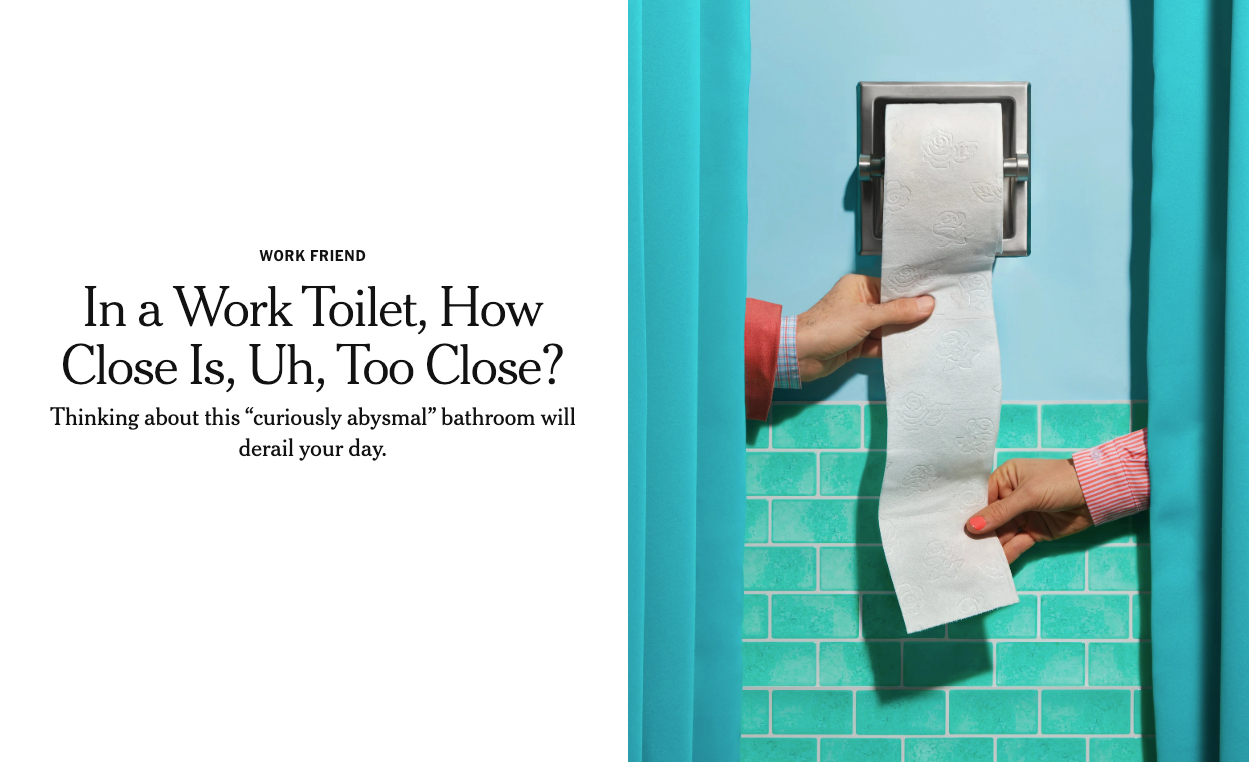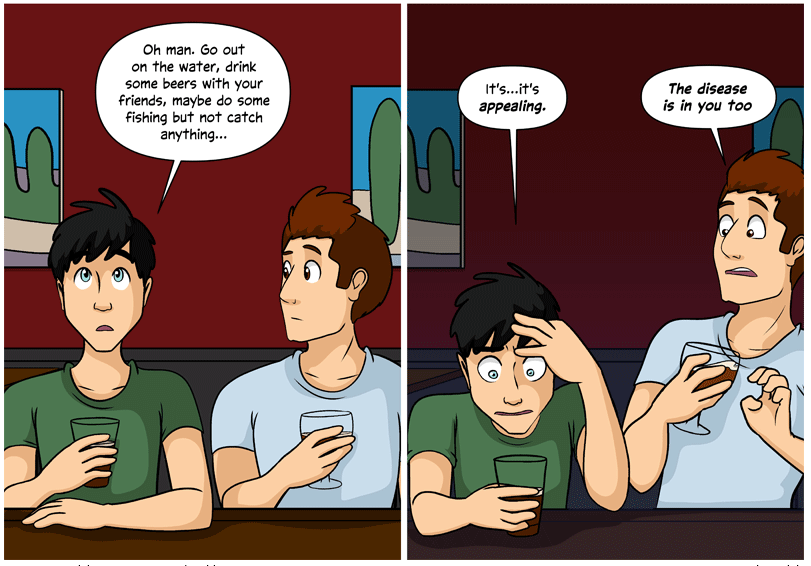Communicative disfluencies interpolations
« previous post | next post »
In the past few days, I've encountered some nice examples of the communicative interpretation of what I've suggested we ought to call "interpolations" rather than "disfluencies".
The title of a recent NYT workfriend piece — "In a Work Toilet, How Close Is, Uh, Too Close?" — illustrates one of the (many) contextual interpretations of the filler word "uh":
Interpretations like these are not news to lexicographers. The OED's entry for uh (from 1921) glosses it as
U.S. Expressing hesitation
but gives these examples, the last two of which are rather like the NYT workfriend example:
1962 J. D. MacDonald Only Girl in Game vi. 85 ‘Are you cashing cheques?’.. The man hesitated. ‘Uh… Yes, we are.’
1973 National Observer (U.S.) 3 Feb. 7/1 He wanted most awfully to see the one in the advertisement about being, uh, well, you know.
1977 N.Y. Rev. Bks. 4 Aug. 32/4 ‘Perhaps we should, uh, wait,’ I said.
Merriam-Webster similarly glosses uh as
—used to express hesitation
but again gives an example where the hesitation is not a failure of lexical access, but rather a (perhaps simulated) failure of nerve:
Do you want to, uh, go out sometime?
And in a recent Questionable Content webcomic, Marten and Steve discuss the dismaying effects of growing up, and Marten illustrates for us what the communicative force of a repeated word can be:
| Marten: | I guess this is how it probably goes for most people. |
| Steve: | Whatcha mean? |
| Marten: | Like, you start off wanting to be a rock star, but still gotta get a job, pay your bills, all that everyday life shit. Eventually you realize you like your everyday life, and being a rock star isn't so appealing any more. |
| Steve: | Yeah dude. Like, I get up every morning, I eat some cereal, I go to work. It's chill. The other day I caught myself fantasizing about buying a boat someday. How normie is that? |
| Marten: | Oh man. Go out on the water, drink some beers with your friends, maybe do some fishing but not catch anything… It's… it's appealing. |
| Steve: | The disease is in you too |
The last panel underlines the emotional content of Marten's repeated "it's":
Dictionaries unfortunately lack any way to create entries for things like that repetition, but I'm sure that we can find evidence from past centuries that people noticed and understood them.
More recently, in 1995, I participated in a six-week summer workshop at the JHU Center for Language and Speech Processing, on the topic "Language Modeling for Conversational Speech Recognition". One of the projects that summer, by Andreas Stolcke and Liz Shriberg, compared several different ways of modeling filler words like "um" and "uh". The first approach was to insert them into the speech stream by means of a process operating on filler-free word sequences. The second approach was to treat them as ordinary words in a conventional n-gram language model. I was interested to learn that they found no reason not to treat fillers as ordinary words, at least based on the estimated perplexity of conversational transcripts and the effects on speech-to-text word error rate. (For links and discussion, see "And uh — then what?", 1/5/2004.)
In a 2002 paper in Cognition ("Using uh and um in spontaneous speaking"), Herb Clark and Jean Fox Tree offered a theory of pause-fillers consistent with both the 1921 OED gloss and the 1996 Stolcke and Shriberg paper:
The proposal examined here is that speakers use uh and um to announce that they are initiating what they expect to be a minor (uh), or major (um), delay in speaking. Speakers can use these announcements in turn to implicate, for example, that they are searching for a word, are deciding what to say next, want to keep the floor, or want to cede the floor. Evidence for the proposal comes from several large corpora of spontaneous speech. The evidence shows that speakers monitor their speech plans for upcoming delays worthy of comment. When they discover such a delay, they formulate where and how to suspend speaking, which item to produce (uh or um), whether to attach it as a clitic onto the previous word (as in “and-uh”), and whether to prolong it. The argument is that uh and um are conventional English words, and speakers plan for, formulate, and produce them just as they would any word.
Their list of reasons for "upcoming delays worthy of comment", though valid as far as it goes, doesn't seem to me to cover the NYT workfriend example, the OED examples, or the MW example. Nor will it work for the "awkward UM" or "dismissive/snotty UM" discussed here a few years ago.
But maybe it shouldn't. The "conventional English word" story can't be generalized to account for the communicative force of Marten's repetition, which seems to involve the implicature generated by a (real or feigned) production error. Whatever the morphosyntax of UM and UH, their (broad) range of communicative effects may perhaps be a similarly Gricean (or Freudian) extrapolation from some simple core interpretation like "signaling hesitation".
This still leaves unexplained many curious facts about the sociology, geography, anthropology, and psychology of the things we call "disfluencies". If you're curious, here are pointers to some of the many LLOG posts about them over the years.
"And uh — then what?" 1/5/2004
"Reanalysis — and not" 2/8/2004
"Clarifying status in Wolof by fake disfluency" 5/20/2004
"um, em, uh, ah, aah, er, eh" 5/2/2005
"Status and fluency" 5/11/2004
"The the the and the thee the" 7/26/2005
"Young men talk like old women" 11/6/2005
"Trends in presidential disfluency" 11/26/2005
"Trembling to be wrong" 12/20/2005
"I mean, you know" 8/19/2007
"The phonetics of flop sweat" 9/26/2008
"'Babbling points' from all over" 9/30/2008
"Speaking (in)coherently" 11/20/2008
"More (dis)fluency and (in)coherence" 12/31/2008
"Who knows?" 1/7/2009
"Uh accommodation" 4/2/2010
"If you will" 7/29/2011
"Repetition disfluency" 8/15/2011
"Fillers: Autism, gender, and age" 7/30/2014
"More on UM and UH" 8/3/2014
"UM UH 3" 8/14/2014
"Male and female word usage" 8/7/2014
"Educational UM / UH" 8/13/2014
"UM / UH geography" 8/13/2014
"UM / UH: Life-cycle effects vs. language change" 8/15/2014
"Filled pauses in Glasgow" 8/17/2014
"ER and ERM in the spoken BNC" 8/18/2014
"Um and Uh in Dutch" 9/16/2014
"UM / UH map in the media" 9/17/2014
"UM / UH in German" 9/29/2014
"Um, there's timing information in Switchboard?" 10/5/2014
"Trending in the Media: Um, not exactly…" 10/7/2014
"UH / UM in Norwegian" 10/8/2014
"On thee-yuh fillers uh and um" 11/11/2014
"UM / UH update" 12/13/2014
"Trump's eloquence" 8/15/2015
"Donald Trump's repetitive rhetoric" 12/5/2015
"Trump's rhetorical style" 12/26/2015
"Gertrude Trump" 6/19/2016
"The em-dash candidate" 8/15/2016
"The rhetorical style of spontaneous speech" 8/16/2016
"The narrow end of the funnel" 8/16/2016
"Disfluencies and smiles" 9/30/2016
"Uh" 10/12/2016
"Mistakes" 3/8/2017
"Fluent disfluency" 3/12/2017
"Presidential fluency" 10/31/2017
"World disfluencies" 5/16/2018
"Qualifying fluency" 6/4/2019
"Dysfluency considered harmful" 5/19/2019


MattF said,
December 14, 2019 @ 4:31 pm
‘Disfluency’ isn’t quite right since it suggests fluency is the norm.
But ‘interpolation’ seems to change the subject… Maybe ‘unfluency’ or ‘non-fluency’ would be better.
bks said,
December 14, 2019 @ 6:08 pm
Mattf: Perhaps "uh, fluency"?
MattF said,
December 14, 2019 @ 6:29 pm
bks: Um, I see what you did there.
John Shutt said,
December 14, 2019 @ 11:44 pm
"Interpolation" suggests to me estimating a point on a curve to maximize smoothness, whereas these are not smooth. On the other hand "disfluency" doesn't work for me either because these devices seem to me sometimes quite skillful. Perhaps "intrusion", which may entail varying degrees of smoothness and/or skill?
Orin K Hargraves said,
December 15, 2019 @ 8:33 am
(Quoting some Internet sage) "Many of these Greek particles act essentially as sentence adverbs, serving either as sign posts that mark the underlying grammatical sentence structure, or providing an emotional emphasis to a word, clause, or sentence that expresses the mood or attitude of the writer." Informal spoken English seems to have particles that make their way into informal written discourse. Can we just call them particles?
Jonathan said,
December 15, 2019 @ 12:26 pm
My experience learning German makes me want to agree with Orin and call them particles.
My experience with computers makes me want to call them "control words", because these words, unlike other words that refer to externals things, refer primarily to the sentence that one is currently producing. (Honestly, I just had this idea and don't know how well it holds up to scrutiny, but I'm curious to hear people reactions.)
Coby Lubliner said,
December 15, 2019 @ 10:10 pm
This kind of "uh" doesn't seem to mee, pragmatically speaking, to differ greatly from interpolated "well", "dare I say" or "as it were".
Adam Werle said,
December 16, 2019 @ 4:14 am
Shelley: Do you like my suit?
Holly: I like the half you've chosen to wear. (¶) It's, you know, a start.
https://bobbins.horse/comic/the-half-youve-chosen-to-wear
John Shutt said,
December 16, 2019 @ 7:56 am
Seems, though, this class of phenomena is not entirely contained in "particles", though there's a large overlap. I don't immediately see how to view the repetition in "It's… it's X" as a particle.
Chandra said,
December 16, 2019 @ 12:36 pm
Performative disfluency, maybe? That feels right for how I use it, anyway.
Ray said,
December 16, 2019 @ 7:46 pm
the nyt example seems like an air quote version of uh (ie, conscious that it’s being used, to consciously convey a slanted meaning). so yeah, “performative” feels right.
John Shutt said,
December 16, 2019 @ 11:10 pm
Performative disfluency makes considerable sense to me (fwiw).
Breffni said,
December 17, 2019 @ 5:32 am
I've been noticing recently that use of "performative" to mean, roughly, "feigned or exaggerated for effect (e.g., "performative empathy"); a useful term, and I agree that it seems to match these phenomena. There might be a problem with using it in pragmatics, though, because "performative" already exists as a term coined by J. L. Austin with a different meaning.
Incidentally, I'm convinced, based on rigorous analysis of my own impressions, that these knowing hesitations have their roots in the conventions of sitcom dialogue.
kfn said,
December 17, 2019 @ 9:19 am
I like “disfluency” here, fwiw. In speech -language pathology circles, some use “dys-“ synonymously with stuttering as a disorder, and “dis-“ to refer to typical nonfluent speech.
John Shutt said,
December 17, 2019 @ 4:42 pm
Affected disfluency?
Jarek Weckwerth said,
December 19, 2019 @ 1:45 pm
Breffni: these knowing hesitations have their roots in the conventions of sitcom dialogue
Spot on! My eight-year-old daughter has recently begun doing these kinds of things and they are so obviously performed (as opposed to performative).